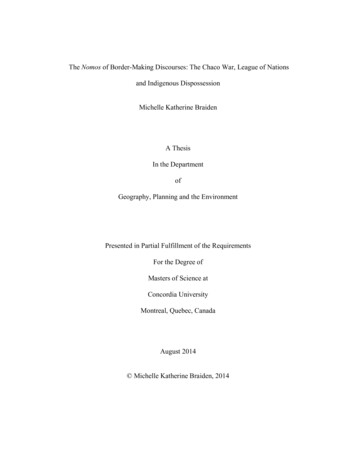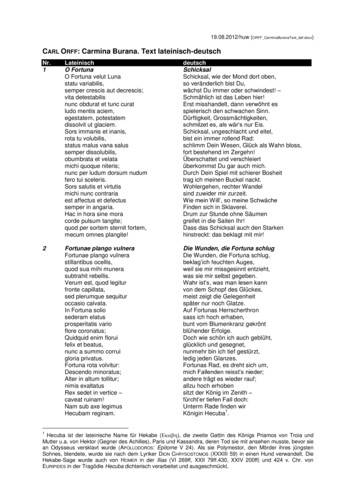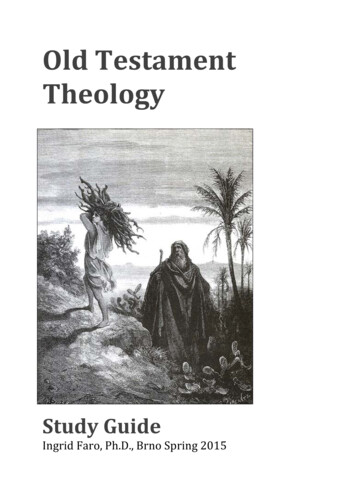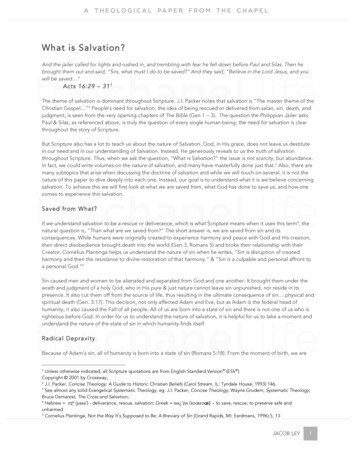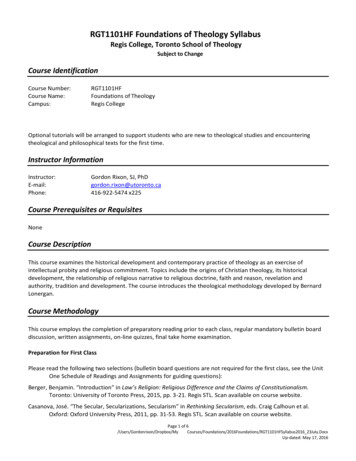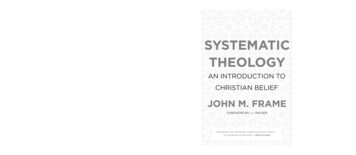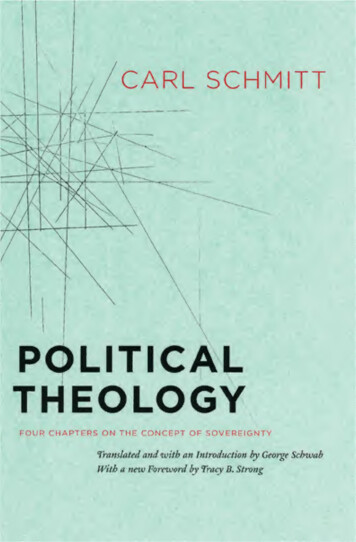
Transcription
CARL SCHMITTPOLITICALTHEOLOGYFOUR CHAPTERS ON THE CONCEPT OF SOVEREIGNTYTramkitd and tuitb an tntmduetian by Gearff SchwabWith awtfUf Famvard byTray B. Strong
Political Theology
Political TheologyFour Chapters on theConcept of SovereigntyCarl SchmittTranslated by George SchwabForeword by Tracy B. StrongThe University of Chicago PressChicago and London
The University of Chicago Press, Chicago 60637This translation 1985 by George SchwabThis book was originally published as Politische Theolo e: Vier Kapitel zurLehre von derSouveranitat 1922, revised edition 1934 by Duncker & Humblot, Berlin.This translation first published in the United States by MIT Press, in the series Studies inContemporary German Social Thought, edited by Thomas McCarthyForeword 2005 by Tracy B. StrongAll rights reserved. Published by arrangement with George Schwab and Duncker &Humblot.University of Chicago Press edition 2005Printed in the United States of America19 18 17 16 15 14 13 12 11 105 6 7 8 9 10ISBN-13: 978-0-226-73889-5ISBN-10: 0-226-73889-2Library of Congress Cataloging-in-Publication DataSchmitt, Carl, 1888[Politische Theologie. English]Political theology: four chapters on the concept of sovereignty / Carl Schmitt; trans lated by George Schwab ; foreword by Tracy Strong.—University of Chicago Press ed.p.cm.Translation of Politische Theologie.Originally published: Cambridge, Mass.: MIT Press, cl 985 in series: Studies incontemporary German social thought.Includes bibliographical references and index.ISBN 0-226-73889-21. Sovereignty 2. Political theology. I. Title.JC327.S3813 2005320.1'5—dc222005048576 The paper used in this publication meets the minimum requirements of the AmericanNational Standard for Information Sciences—Permanence of Paper for Printed LibraryMaterials, ANSI Z39.48-1992
ContentsForewordviiTracy B. StrongIntroductionxxxviiGeorge SchwabPreface to the Second Edition (1934)1 Definition of Sovereignty15Sovereignty and a state of exception. The concept of sovereignty inBodin and in the theory of the state based on natural law as examplesof conceptual links between sovereignty and a state of exception.Disregard of the exception in the doctrine of the liberal constitutionalstate. General signihcance of the diverse scholarly interest in rule(norm) or exception.2 The Problem of Sovereignty as the Problem ofthe Legal Form and of the DecisionRecent works on the theory of the state: Kelsen, Krabbe, Wolzendorff.The peculiar character of the legal form (as against the technical orthe aesthetic form) resting on decision. The contents of the decision,the subject of the decision, and the independent significance of thedecision in itself Hobbes as an example of “decisionist” thinking.16
Contents3 Political Theology36Theological conceptions in the theory of the state. The sociology ofjuristic concepts, especially of the concept of sovereignty. Thecorrespondence between the social structure of an epoch and itsmetaphysical view of the world, especially between the monarchicalstate and the theistic world view. The transition from conceptions oftranscendence to those of immanence from the eighteenth to thenineteenth century (democracy, the organic theory of the state, theidentity of law and the state).4 On the Counterrevolutionary Philosophy of theState (de Maistre, Bonald, Donoso Cortes)53Decisionism in the counterrevolutionary philosophy of the state.Authoritarian and anarchist theories based on the opposing theses ofthe “naturally evil” and “naturally good” human being. The positionof the liberal bourgeoisie and Donoso Cortes’s definition of it. Thedevelopment from legitimacy to dictatorship in the history of ideas.Index67
ForewordThe Sovereign and the Exception: CarlSchmitt, Politics, Theology, and LeadershipIn memory and appreciation of Wilson Carey McWilliams, 1933 -2005He whofights with monsters should look to it that he himself does not become amonster. And when you gaze long into an abyss the abyss also gazes into you.Nietzsche, Beyond Good and EvilPolitical Theology is about the nature, and thus about the preroga tives, of sovereign political authority as it develops in the West,about its relation to Western Christianity, and about some of itsforemost exponents. While by no means the first writing of CarlSchmitt, it is perhaps the piece that best serves as an introductionto his thought.Schmitt was a—perhaps the—leading jurist during the Wei mar Republic. In May 1933, he joined the National SocialistGerman Workers Party (the Nazi Party), the same month as didMartin Heidegger, the leading philosopher in Germany. In No vember of that year he became the president of the NationalSocialist Jurists Association. He published several works thatwere supportive of the Nazi Party, including some that were anti-1. G. Balakrishnan, The Enemy: An Intellectual Portrait of Carl Schmitt (London: Verso, 2000).Balakrishnan argues that until the last years of the Weimar Republic Schmitt expressed noanti-Semitic views and that during the Nazi period, he “became skilled at transformingcrude anti-Semitic ideograms into a higher order theoretical discourse.” See also the ex change between him and Scheuerman, “Down on Law: The complicated legacy of the au thoritarian jurist Carl Schmitt” in Boston Review (April-May 2001).vii
viiiTracy B. StrongSemitic. All did not go smoothly: one tends to forget that therewere diverse factions in Nazism, as there are in all political move ments, and Schmitt found himself on the losing side of severalcontroversies. Criticized in several official organs, he was pro tected by Hermann Goering. He remained a member of theParty as well as professor of law at the University of Berlin be tween 1933 and 1945, and was detained afterwards by the vic torious Allies, but never charged with crimes. He died in April1985.As early as 1938 and again after World War II, Schmitt wasfond of recallingCereno one of Herman Melville’s novels, inobvious reference to his choices in 1933 and after. The novel wastranslated into German in 1939 and was apparently widely readand discussed in terms of the contemporary political situation. The title character in Benito Cereno is the captain of a slave shipthat has been taken over by the African slaves. The owner of theslaves and most of the white crew have been killed, although DonBenito is left alive and forced by the slaves’ leader, Babo, to playthe role of captain so as not to arouse suspicion from other ships.Eventually, after a prolonged encounter with the frigate of theAmerican Captain Delano during which the American at first2. See the discussion in my “Dimensions of the Debate Around Carl Schmitt,” Foreword toCarl Schmitt, The Concept of the Political ifChicdigo'. University of Chicago Press, 1996), x-xii,and the references cited there for further discussion of these events.3. Carl Schmitt, Ex Captivitate Salus: Efahrungen der eit 1945/47 (Cologne: Greven Verlag,1950), 22-11. Thanks to John McCormick for this reference. Let me take this occasion topay tribute to McCormick’s wonderful book on Carl Schmitt, Carl Schmitt’s Critique of Liberal ism: Against Politics as Technology (Cambridge: Cambridge University Press, 1997), from whichI have learned a great deal.4. Schmitt notes that “Benito Cereno, the hero [!!] of Herman Melville’s story, was elevatedin Germany to the level of a symbol for the situation of persons of intelligence caught in amass system.” Schmitt, “Remarks in response to a talk by Karl Mannheim (1945-1946),” inEx Captivate Salus. Experiences des annees 1945—1947. Textes et commentaires, ed. A. Doremus(Paris: Vrin, 2003), 133.
ForewordIXsuspects Cereno of malfeasance—he cannot conceive of the pos sibility that slaves have taken over a ship—the truth comes out:the slaves are recaptured and imprisoned, some executed.In a letter apparently written on his fiftieth birthday in 1938,Schmitt signed himself as “Benito Cereno.” This passage fromthe end of the novel, although not one I know Schmitt to havecited explicitly, is iu particular relevant:“Only at the end did my suspicions [of you, said Captain Delano toBenito Cereno] get the better of me, and you know how wide of the markthey then proved.”“Wide, indeed,” said Don Benito, sadly; “you were with me all day;stood with me, sat with me, talked with me, looked at me, ate with me,drank with me; and yet, your last act was to clutch for a villain, not only aninnocent man, but the most pitiable of all men. To such degree may ma lign machinations and deceptions impose. So far may even the best menerr, in judging the conduct of one with the recesses of whose condition heis not acquainted. But you were forced to it; and you were in time unde ceived. Would that, in both respects, it was so ever, and with all men.”“I think I understand you; you generalize, Don Benito; and mournfullyenough. But the past is passed; why moralize upon it? Forget it. See, yonbright sun has forgotten it all, and the blue sea, and the blue sky; thesehave turned over new leaves.” 5. Copies of the supposed letter were sent to several people after the War, among themArnim Mohler, who reprinted it in the publication of his correspondence with Schmitt.(Mohler was the historian-theorist of the “conservative revolution” in Germany, and, as di rector of the Carl Siemens-Stiftung after the war, a central intellectual figure of the extremeright in Germany) Schmitt had apparently wanted this letter to become the epigraph to areissuing of his book on Hobbes, Der Leviathan in der Staatslehre des Thomas Hobbes. Sinn und Feldschlageinespolitischen Symbols (Hamburg: Hanseatische Verlaganstalt, 1938), w hich could thenbe taken as an esoteric text of resistance to Nazism. Wolfgang Palaver (“Carl Schmitt,mythologue politique,” in Carl Schmitt, Le Leviathan dans la doctrine de Vetat de Thomas Hobbes[Paris: Seuil, 2002], 220-24) casts considerable doubt on the complete (though not the par tial) truth of this possibility See also Carl Schmitt, Ex Captivate Salus. Experiences des annees1945—1947. Textes et commentaries.) ed. A. Doremus (Paris: Vrin, 2003), 209.6. Hermann Melville, Benito Cereno in Herman Melville, Billy Budd and Other Tales (New York:The New American Library, 1961).
Tracy B. StrongXHow was it, the captain of the second ship wishes to know, thatBenito Cereno was taken in by the evil brewing under his nose?Cereno notes that had he been more acute, it might in fact havecost him his life. Indeed, as he protests, since “malign machina tions and deceptions impose” themselves on all human beings, hehad no choice but to play the role in which Babo had cast him.That Schmitt was fond of calling upon the Melville story is com plexly revelatory. The captain of a ship might be thought of as themodel of what we mean by a “sovereign.” Yet here we have astory about a man obliged to accept the pose of being in controlwhile actually going along with evil because his safety required it.At the very end of Melville’s story, after Babo and the other slaveshave been captured, a shroud falls from the bowsprit of Cereno’serstwhile ship to reveal the skeleton of the slave owner murderedby the revolted slaves, and over it the inscription “Follow yourleader.” Benito Cereno is about, among other things, what being asovereign or captain is, how one is to recognize one, and the mis takes that can be made when one doesn’t. The present volume, reissued with a new foreword but other wise “unchanged” in a second edition in November 1933, afterSchmitt had joined the Nazi party, can thus be read on one handas a document relevant to Schmitt’s decision to see himself as al lied with the NSDAP, and what that allegiance meant. To see thechoice that Schmitt (or Heidegger, or many other Germanphilosophers, theologians, artists, as well as people from all walksof life—not just in Germany, and not just then) made as blind or7. William Scheuerman (The End of Law [Lanham: Rowman and Littlefield: 1999], 176-78)advances an alternate reading to the effect that Schmitt’s invocation of Benito Cereno is de signed not so much to exculpate himself from the worst of the Nazi taint but to evince his dis tress at being subject to the multi-racial, Jew-dominated American occupying power. It ispossible that this is true postwar but, assuming that Schmitt actually did write the letter in1938, hardly could have been true beforehand. These understandings are not mutually ex clusive.
ForewordXIignorant or born from venal ambition, is, I think, to misunder stand their thought and their life. It is also to sweep under thetable what appeared as the appeal and apparent necessity of sucha movement, and to avoid serious engagement with why it ap peared as such.* * *The above is written as preliminary. Schmitt also appears to us asthe author of some of the most searching works of political the ory in the last century, books whose appeal has over time coveredthe political spectrum from Left to Right. What is the nature ofhis importance and his appeal? The present volume is also a cen tral document in answer to that question.Political Theology was originally published in 1922 and it rep resents Schmitt’s most important initial engagement with thetheme that was to preoccupy him for most of his life: that of sov ereignty—that is, of the locus and nature of the agency that con stitutes a political system. The first sentence of Political Theology isfamous: it locates the realm in which Schmitt asserts the questionof the centrality of sovereignty. Schmitt places the sentence as thecomplete initial paragraph in the body of the book. He writes:“Sovereign is he who decides on the exceptional case.” Translation is always interpretation, and the opening sentenceraises immediately a number of issues. The first is consequentto the nature and range of the “decide.” The German is Soverdnist, wer uher den Ausnahmezustand entscheidetP The decisive mattercomes from the fact that translation imposes on us the temptationto think that uber\s ambiguous: in English the sentence can be ren dered “he who decides what the exceptional case is” or “he who8. Carl Schmitt, Political Theology (Cambridge, Mass.: MIT Press, 1985), 5 (hereafter cited intext as PT).9. Carl Schmitt, Politisches Theologie (BerMn: Duncker und Humblot, [2002] 2004).
xiiTracy B. Strongdecides what to do about the exceptional case.”George Schwab’sfine translation in this volume—“decides on the exception”—re tains the ambiguity, if it condenses “case” into “exception.” Yetthe fact that this may appear ambiguous in English or Germanshould not detain us in a misguided manner: retaining the seem ing ambiguity is central to grasping what Schmitt wants to say. Wecan see this in part in the fact that tntscheiden ilber can also mean“to settle on”: Schmitt is saying that it is the essence of sovereigntyboth to decide what is an exception and to make the decisions ap propriate to that exception, indeed that one without the othermakes no sense at all.It is thus not only the case that “exceptions” are obvious, as theywould be if we think of them as when produced by severe eco nomic or political disturbance. It could appear natural to readwhat Schmitt says in Germany back through the years of hyperinfiation or the economic depression of 1929. Political Theology however, was published in March 1922 and cannot be understoodas simply the response to these or any other developments (hyper-10. This is noted also by John McCormick in “The Dilemmas of Dictatorship: Carl Schmittand Constitutional Emergency Powers,” in D Dyzenhaus, ed., Law as Politics: Carl Schmitt’sCritique of Liberalism (Durham, N.C.: Duke University Press, 1998), 223. McCormick seesthis, too strongly for me, as a move by Schmitt aw ay from conservatism towards fascism(218). See my discussion of Schmitt’s doctrine of sovereignty immediately below For theproblem in French, see the discussion byjulien Freund, a friend of Schmitt and a contribu tor to his Festschrift, in the right-wing French journal La nouvelle Scale, 44 (Spring 1987): 17.Freund opts in French for lors (during, on the occasion of) as the translation of iiber. This judg ment is refused byJean-Louis Schlegel, the editor of the Gallimard French edition of Theologiepolitique {Gallimard: Paris, 1988), 15, who gives decide de. See my discussion of right-wing,left-wing, and liberal uses and misuses of Schmitt in “Dimensions of the New DebateAround Carl Schmitt,” Introduction to Carl Schmitt, The Concept of the Political (Chicago:University of Chicago Press, 1996). For a recent defense of Schmitt by the French Right, seeAlain de Benoist, “Carl Schmitt et les sagouins [a sagouin is a slob or slovenly person],”Elements n 110, septembretxtWeb.php?idArt 180.2003, available online at http://ww .grece-fr.net/textes/
Forewordxiiiinflation hits only in 1923). Indeed, George Schwab’s careful re construction of Schmitt’s analysis of Article 48 of the Weimarconstitution (xix-xxi, this volume) shows that Schmitt had a verybroad interpretation of what the President might do if “public se curity and order [were] considerably disturbed . .A second translation issue with the opening sentence unfoldsfrom the understanding of Ausnahmezustand. What the first trans lation might seem to reinforce (the absolute and dictatorial andunlimited quality of the decision), this second one might seem tomitigate. A dictionary will tell you that the word means “state ofemergency.” The idea of a “state of emergency,” however, hasmore of a legal connotation, and is more confined than an “ex ception.” It is also the case, asJean-Louis Schlegel points out, thatSchmitt sometimes uses more general words when speaking of“the exception,” including “state of exception” {Ausnahmefall) “crisis or state of urgency” {Notstand) and even more generally“emergency, state of need” {Motfall)}' Thus the same issue israised as with the uber. can the understanding of what counts asan “exception” be defined in legal terms, or is it more of what onemight think of as an open field?Note here that Schmitt is not talking simply about dictatorship.In Die Diktatur published one year before PT, Schmitt differ entiates between “commissarial dictatorship”—he cites Lincoln11. See the fine discussion in J. E McCormick, “The Dilemmas of Dictatorship: CarlSchmitt and Constitutional Emergency Powers,” in Dyzenhaus, Law as Politics, 217-51.12. Schlegel, Theolo epolitique, 15n.13. One should note here that this question bedevils all situations in which constitutions pro vide for an exception. For a brief history of nineteenth- and tw entieth-century constitutionalprovisions for exception, including the French 1814 Constitution, World War One in Franceand Switzerland, the 1920 Emergency Powers Act in England, Lincoln at the beginning ofthe Civil War (noted by Schmitt in Die Diktatur [Munich: Duncker und Humblot, 1921],136), the United States under Wilson during World War One, Article 16 of the French FifthRepublic, etc., see Giorgio Agamben, State of Exception (Chicago: University of ChicagoPress, 2005), 11-26.
xivTracy B. Strongin the Civil war as an example—and “sovereign dictatorship.”The former defends the existing constitution and the latter seeksto create the conditions for a new one, given the collapse of theold—one might think to some degree of de Gaulle in 1958. DieDikaturh a theory of dictatorship; PT, however, is a theory of sov ereignty and an attempt to locate the state of emergency in a the ory of sovereignty. More importantly, PT in effect discusses thatwhich for Schmitt lies under the various kinds of dictatorship andmakes both of them possible.I again do not think this linguistic glide on Schmitt’s part to beaccidental. Rather than seeking to determine what precisely an“exception” (or an “emergency” or a “crisis,” etc.) is, the problemshould be looked at from the other direction. It is importantly thecase for Schmitt that no pre-existing set of rules can be laid downto make explicit whether this situation “is” in actual reality an“exception.” It is of the essence of Schmitt’s conception of thestate that there can be no preset rule-fixed definition of sover eignty.Why not? What is clear here is that the notion of sover eignty contains, as Schmitt tells us, his general theory of the state(PT, 5). The nature of the sovereign, he remarks in the preface tothe second edition (1934), is the making of a “genuine decision”(PT, 3). Thus it is not simply the making of a decision, but of a“genuine” decision that is central. The obvious question is whatmakes a decision “genuine” and not simply an emanation of a“degenerate decisionism.” Schmitt is never “simply” a decision14. I thus resist John McCormick’s conclusion that PT “repudiates much of what is of valuein the book published before it” in his “Dilemmas of Dictatorship,” in Dyzenhaus, Law asPolitics, 241.15. Thus the exception is part of the “order” even if that order is not precisely juridical.Schmitt engaged in an exchange about this with Walter Benjamin over violence. See Ben jamin, “Towards a Critique of Violence,” in Walter Benjamin, Selected 1 Vritings, vol. 1 (Cam bridge: Harvard University Press, 1996). See the discussion in Agamben, State of Exception,52-64.
ForewordXVist, if by that one means simply that choice is necessary and anychoice is better than none. What constitutes a “genuine decision” is a complex matter inSchmitt. To understand his position one must realize why politics(or here, “the political”) is not the same for Schmitt as “thestate,”even if the most usual framework for the concretizationof politics in modern times has been the state.In a book pub lished in 1969 that takes up the themes of PT Schmitt writes “to day one can no longer define politics in terms of the State; on thecontrary what we can still call the State today must inversely bedefined and understood from the political.”Underlying thestate is a community of people—necessarily not universal—a“we” that, as it defines itself necessarily in opposition to thatwhich it is not, presupposes and is defined by conflict.' It derivesits definition from the friend/enemy distinction. That distinction,however, is an us/them distinction, in which the “us” is of pri mary and necessary importance.16.1 note here that there seem to be strong elements of Schmitt quietly present in much ofHenry Kissinger’s analyses of international politics. See for instance his The Necessity forChoice (New York: Harper, 1961).17. This is a theme from Schmitt’s earliest work, including his Habilitationsschrift, Der T Vert desStaates und die Bedeutung des Einzeln (Tubingen: Hellerau, 1917). See Reinhard Mehring, CarlSchmitt, ur Einfuhrung (Hamburg: Junius, 2001), 19-21.18. Cf Max Weber’s definition of the state: “Nowadays, however, we have to say that thestate is the form of human community that (successfully) lays claim to the monopoly of le gitimate violence within a given territory .” Max Weber, “Politics as a Vocation,” in TheVocation Lectures, ed. David Owen and Tracy B. Strong, 33 (Hackett, 2002). See the discussionof this passage in our introduction to the Weber lectures, xlix. It is important that this is thedefinition to which the “nowadays” compels us and that Weber here flies directly in the faceof those (like the Georgkreis and others) who placed emphasis on the “nation,” on “bloodand soil.”19. Carl Schmitt, Politisches7/(Berlin: Duncker und Humblot, [1969] 1996), 21.20. One thus finds the influence of Schmitt for instance in what might appear to be a far re moved locus, e.g. Bertram de Jouvenel, The Pure Theory of Politics (New Haven, Conn.: YaleUniversity Press, 1964).
xviTracy B. StrongThis claim is at the basis of Schmitt’s rejection of what he calls“liberal normativism”—that is, of the assumption that a state canultimately rest on a set of mutually agreed-to procedures andrules that trump particular claims and necessities. Pluralism isthus not a condition on which politics, and therefore eventuallythe state, can be founded. Politics rests rather on the equality of itscitizens (in this sense Schmitt is a “democrat”) and thus their col lective differentiation from other such groups: this is the “friend/enemy” distinction, or more accurately the distinction that makespolitics possible. It is, one might say, its transcendental presuppo sition.- Politics is thus different from economics, where one has “com petitors” rather than friends and enemies, as it is different fromdebate, where one has Diskussionsgegner (discussion opponents).It is not a private dislike of another individual; rather it is the ac tual possibility of a “battling totality” {kdmpfende Gesamtheit) thatfinds itself necessarily in opposition to another such entity. “Theenemy,” Schmitt notes, “is hostis (enemy) not inimicus (disliked) inthe broader sense; polemios (belonging to war) not exthros (hate-ful).”23These considerations are made in the context of several other21. This is confirmed explicitly in a letter from Leo Strauss to Schmitt, September 4, 1932.It is printed in Heinrich Meier, Carl Schmitt, and Leo Strauss: The Hidden Dialogue (Chicago: Uni versity of Chicago Press, 1995), 124. Meier’s book is an insightful analysis of the differencebetween political theology and political philosophy—between Schmitt and Strauss. For anextended critique of Meier’s complex political rapprochement of Strauss and Schmitt, seeRobert Howse, “The Use and Abuse of Leo Strauss in the Schmitt Revival on the GermanRight: The Case of Heinrich Meier” (forthcoming), a draft of which is available online athttp://facultylaw.umich.edu/rhowse/Drafts and Publications/Meierbookrev.pdf22. Carl Schmitt, DasBegrijf des Politischen (Berlin: Duncker und Humblot, [1932] 2002), 28.The Concept of the Political iphicdigp'. University Chicago Press, 1996), 28.23. Schmitt, Das Begrijf des Politischen, 29 (English, 28). Translations are mine as Schmittquotes in Latin and Greek. Schmitt will on the next page of this text read “Love thine enemyas thyself” as referring to inimicus.
Forewordxviiarguments. The first comes in his discussion of Hans Kelsen. Atthe time that Schmitt wrote the present volume, Kelsen was aleader in European jurisprudence, a prominent Austrian juristand legal scholar as well as a highly influential member of theAustrian Constitutional Court. A student of Rudolf Stammler,Kelsen was a neo-Kantian by training and temperament, andshortly before the publication of PThad published Das Problem derSouverdnitdt und die Theorie des Vdlkerrechts, ' in which he set out thefoundations for what he would later call a “pure theory of law,” atheory of law from which all subjective elements would be elimi nated. Kelsen sought, in other words, a theory of law thatwould be universally valid for all times and all situations.Against this, Schmitt insists that “all law is situational law” {PT,13). What he means by this is that in actual lived human fact it willalways be the case that precisely at unpredictable times “thepower of real life breaks through the crust of a mechanism thathas become torpid by repetition” (PT, 15). Schmitt, in otherwords, requires that his understanding of law and politics re spond to what he takes to be the fact of the ultimately unruly andunruled quality of human life. And if life can never be reduced oradequately understood by a set of rules, no matter how complex,then in the end, rule is of men and not of law—or rather that therule of men must always existentially underlie the rule of law. ForSchmitt, to pretend that one can have an ultimate “rule of law” is24. Hans Kelsen, Das Problem der Souverdnitdt und die Theorie des Vdlkerrechts [The Problem ofSovereignty and the Theory of International Law] (Tubingen: Mohr, 1920). See the articleson Kelsen in European Journal of International La w 9.2 (1998), especially that by Danilo Zolo.25. A volume of articles comparing Schmitt and Kelsen has been published: Hans Kelsen andCarl Schmitt: A Juxtaposition, ed. Dan Diner and Michael Stolleis (Tel Aviv: Schriftenreihen desInstituts fur deutsche Geschichte, University of Tel Aviv, 1999).26. After 1933 Schmitt was apparently instrumental in the removal of Kelsen from the LawFaculty of the University of Kdln. See D. Dyzenhaus, Legality and Legitimacy: Carl Schmitt, HansKelsen, and Hermann Heller ifA'idoYd'. Clarendon, 1997), 84.
xviiiTracy B. Strongto set oneself up to be overtaken by events at some unpredictablebut necessarily occurring time and it is to lose the human elementin and of our world.This is a powerful and important theme in Schmitt. It is not aclaim that law is not centrally important to human affairs, butrather that in the end human affairs rest upon humans and can not ever be independent of them. In his discussion of Locke, forinstance, he criticizes Locke for saying that while the “law givesauthority,” he (Locke) “did not recognize that the law does notdesignate to whom it gives authority. It cannot be just any body. . . .” {PT 32). Schmitt contrasts this to Hobbes’s discus sion (and in doing so brings out qualities often overlooked in dis cussions of Hobbes). He cites Leviathan chapter 26, to the effect27. One might in fact see much of the philosophical debates in the 1920s and 1930s as between those who sought to develop understandings that were independent of time and placeand those who argued that all understanding needed to be grounded in concrete historicalactuality One might see Max Weber as the progenitor of both approaches. See the excep tional book by Michael Friedmann, A Parting of the IVays: Carnap, Cassirer, and Heidegger(Chicago: Open Court, 2000).28. One might have thought here that Schmitt would have referred to Locke’s discussion ofthe prerogative. Thus in the Second Treatise on Government, Locke writes: “What then could bedone in this case to prevent the community from being exposed some time or other to emi nent hazard, on one side or the other, by fixed inte
CARL SCHMITT . POLITICAL . THEOLOGY . FOUR CHAPTERS ON THE CONCEPT OF SOVEREIGNTY . Tramkitd an

